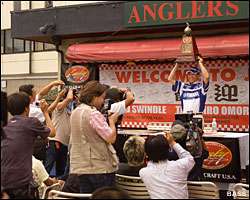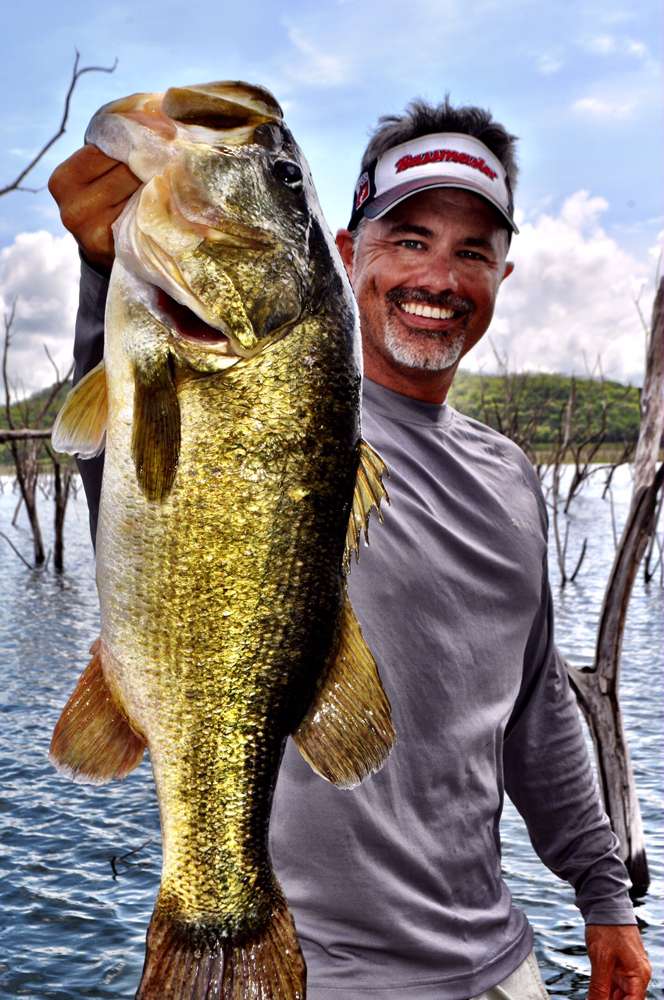
KYOTO, Japan — Popeye's tackle shop was seemingly lifeless when the tour bus pulled into its small parking lot. The store manager opened the door, smiling wildly, and stood under a banner that said in both English and Japanese, "Welcome To Japan: Takahiro Omori, Bassmaster Classic Champion." When Omori stepped off the bus it made official his first appearance as bass fishing's world champion in his homeland.
As the staff of the tackle shop poured through the doors to greet Omori, bowing respectfully, the bass fanatics of Kyoto somehow knew he had arrived. Minutes later, the shop was full of autograph seekers and fans hoping to get a photo with T.O. (as he is affectionately called by his peers) and the Classic trophy, marking the first time the symbol has left the United States.
"The support has been very, very good," said Omori. "This championship is not just for me, but for Japan. I am proud to bring the trophy to my country," he said.
And Japan is proud of T.O.
As the crowd entered the store, ESPN's coverage of the 2004 Classic was playing on video screens, posters of Omori at the Classic were hanging on the walls and copies of Japanese fishing magazines with T.O. on the cover were laying everywhere.
The trophy was placed on a display case at the rear of the store and a line formed as Omori stood and took photos with every fan that wanted one. Two hours later, the first stop on Omori's victory tour had come to an end. It was already 10:00 p.m., and T.O. had to be on the water by 6:00 a.m. for a photo shoot with Japanese media, BASSMASTER Magazine and an ESPN Outdoors television crew. He had just arrived, but already his itinerary was hectic. In the short amount of time that has passed since Charlotte, he has grown accustomed to the demands placed on the Classic champ.
"My phone seems to never stop ringing. I don't get much time to relax," he said.
Even though Omori admits that fishing is a true form of relaxation for him, the soothing effects of the sport were probably dampened by the five media boats following him the next morning on Lake Biwa. And before a lens cap had been removed by the armada of press, Omori had a bass in the boat. "This is a really great bass lake. It is unfortunate that we cannot release the fish back into the water," Omori said as he placed the fish in the livewell.
In Japan, bass are considered a nonnative species and fishermen who catch them must remove the fish from the lake (in most areas in the country), or face potential fines. Although Japanese bass anglers are lobbying against this rule, not much headway has been made. Hopes are that Omori's success on a global stage will help validate the bass as a sporting species and turn the tide on governmental restrictions on bass angling.
As T.O. continued to move down the shoreline of Biwa, flipping a creature bait to cane that lines the shallows and burning a spinnerbait over submerged grassbeds, the international passion of bass fishing shone bright. Omori's sport is bigger than the United States and bigger than Japan. With an ancient Japanese temple as a backdrop, roof flared toward the sky, T.O. set the hook on another fish. The Japanese bystanders and American visitors alike went nuts, clapping and yelling for more. And once again, these cultures were connected through bass fishing.
This was just the first 18 hours of a week-long trek planned for T.O., but this victory tour may last much longer than anyone can fathom.

